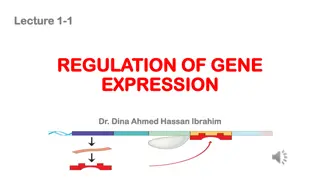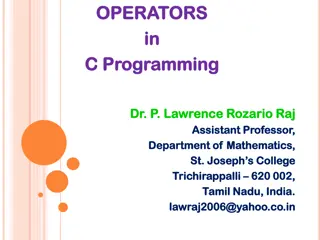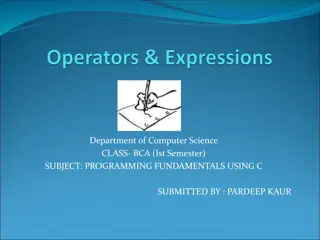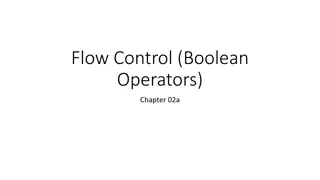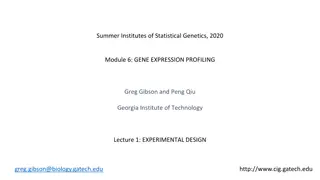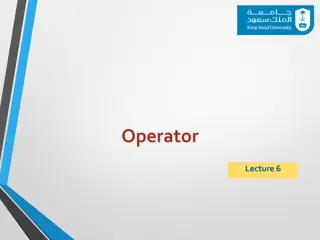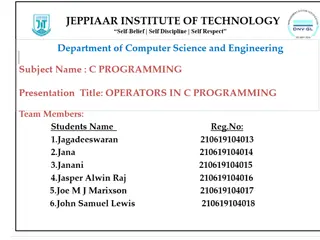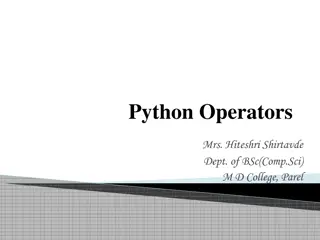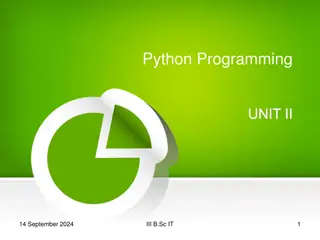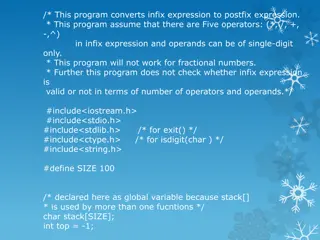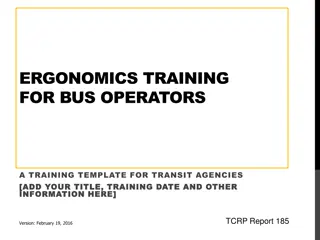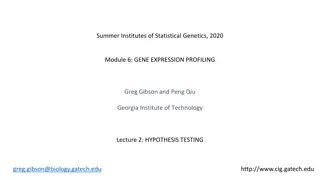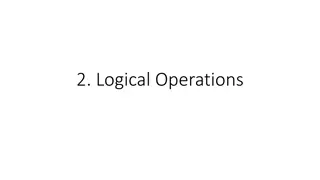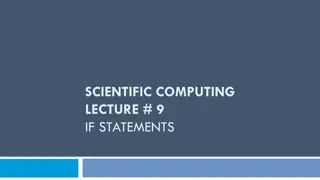
Types of C Operators and Expressions Explained
Learn about various types of operators in C language such as Arithmetic operators, Assignment operators, Increment/decrement operators, Relational operators, Logical operators, Bitwise operators, Conditional operators, and Special operators. Understand how arithmetic operations work in C programs for different types of operands.
Download Presentation

Please find below an Image/Link to download the presentation.
The content on the website is provided AS IS for your information and personal use only. It may not be sold, licensed, or shared on other websites without obtaining consent from the author. If you encounter any issues during the download, it is possible that the publisher has removed the file from their server.
You are allowed to download the files provided on this website for personal or commercial use, subject to the condition that they are used lawfully. All files are the property of their respective owners.
The content on the website is provided AS IS for your information and personal use only. It may not be sold, licensed, or shared on other websites without obtaining consent from the author.
E N D
Presentation Transcript
Operators And Expression Dr. Sheak Rashed Haider Noori Associate Professor & Associate Head Department of Computer Science
Operators and Expressions Consider the expression A + B * 5 , where, + , * are operators, A, B are variables, 5 is constant, A, B and 5 are called operand, and A + B * 5 is an expression.
Types of C operators C language offers many types of operators, such as: Arithmetic operators Assignment operators Increment/decrement operators Relational operators Logical operators Bit wise operators Conditional operators (ternary operators) Special operators
Arithmetic operators Assignment operators Inc/dec operators Relational operators Logical operators Bit wise operators Conditional operators Special operators Arithmetic Operators C Arithmetic operators are used to perform mathematical calculations like addition, subtraction, multiplication, division and modulus in C programs.
Arithmetic Operators Arithmetic operators Assignment operators Inc/dec operators Relational operators Logical operators Bit wise operators Conditional operators Special operators There are three types of arithmetic operations using arithmetic operators: Integer arithmetic : when all operands are integer. If a=15 , b=10, a + b =25 a / b =1 (decimal part) a % b =5 (remainder of division) Real arithmetic : All operands are only real number. Ifa=15.0 , b=10.0 a / b = 1.5 Mixed model arithmetic : when one operand is real and another is integer. If a=15 and b= 10.0 a / b = 1.5 whereas, 15/10=1 Note: The modulus operator % gives you the remainder when two integers are divided: 1 % 2 is 1 and 7 % 4 is 3. The modulus operator can only be applied to integers.
Arithmetic operators Assignment operators Inc/dec operators Relational operators Logical operators Bit wise operators Conditional operators Special operators Arithmetic Operators Integer arithmetic : When an arithmetic operation is performed on two whole numbers or integers than such an operation is called as integer arithmetic. It always gives an integer as the result. Let x = 27 and y = 5 be 2 integer numbers. Then the integer operation leads to the following results. x + y = 32 x y = 22 x * y = 115 x % y = 2 x / y = 5
Arithmetic operators Assignment operators Inc/dec operators Relational operators Logical operators Bit wise operators Conditional operators Special operators Example program for C arithmetic operators Output: Addition of a, b is : 60 Subtraction of a, b is : 20 Multiplication of a, b is : 800 Division of a, b is : 2 Modulus of a, b is : 0
Arithmetic operators Assignment operators Inc/dec operators Relational operators Logical operators Bit wise operators Conditional operators Special operators Arithmetic Operators Real arithmetic : When an arithmetic operation is preformed on two real numbers or fraction numbers such an operation is called real or floating point arithmetic. The modulus (remainder) operator is not applicable for floating point arithmetic operands. Let x = 14.0 and y = 4.0 then x + y = 18.0 x y = 10.0 x * y = 56.0 x / y = 3.50
Arithmetic operators Assignment operators Inc/dec operators Relational operators Logical operators Bit wise operators Conditional operators Special operators Arithmetic Operators Mixed mode arithmetic : When one of the operand is real and other is an integer and if the arithmetic operation is carried out on these 2 operands then it is called as mixed mode arithmetic. If any one operand is of real type then the result will always be real Let x = 15 and y = 10.0 then x / y = 1.5 Note that: 15 / 10 = 1 (since both of the operands are integer)
Arithmetic operators Assignment operators Inc/dec operators Relational operators Logical operators Bit wise operators Conditional operators Special operators Assignment Operators In C programs, values for the variables are assigned using assignment operators. For example, if the value 10 is to be assigned for the variable sum , it can be assigned as sum = 10; Shorthand or
Increment and Decrement Operators Arithmetic operators Assignment operators Inc/dec operators Relational operators Logical operators Bit wise operators Conditional operators Special operators There are two more shorthand operators: Increment _ _ Decrement ++ These two operators are for incrementing and decrementing a variable by 1. For example, the following code increments i by 1 and decrements j by 1.
Arithmetic operators Assignment operators Inc/dec operators Relational operators Logical operators Bit wise operators Conditional operators Special operators Increment and Decrement Operators The ++ and - - operators can be used in prefix or suffix mode, as shown in Table
Arithmetic operators Assignment operators Inc/dec operators Relational operators Logical operators Bit wise operators Conditional operators Special operators Increment and Decrement Operators If the operator is before (prefixed to) the variable, the variable is incremented or decremented by 1, then the new value of the variable is returned. If the operator is after (suffixed to) the variable, then the variable is incremented or decremented by 1, but the original old value of the variable is returned. Therefore, the prefixes ++x and --x are referred to, respectively, as the preincrement operatorand the predecrement operator; and the suffixes x++ and x -- are referred to, respectively, as the postincrement operatorand the postdecrement operator.
Arithmetic operators Assignment operators Inc/dec operators Relational operators Logical operators Bit wise operators Conditional operators Special operators Increment and Decrement Operators The prefix form of ++ (or --) and the suffix form of ++ (or --) are the same if they are used in isolation, but they cause different effects when used in an expression. The following code illustrates this: In this case, i is incremented by 1, then the old value of i is returned and used in the multiplication. So newNum becomes 100. If i++ is replaced by ++i as follows, i is incremented by 1, and the new value of i is returned and used in the multiplication. Thus newNum becomes 110.
Exercise on ++ and - - Arithmetic operators Assignment operators Inc/dec operators Relational operators Logical operators Bit wise operators Conditional operators Special operators int x=2 , y = 5; 1. x++ ; y++ ; 2. x=y++ + x++; 3. y=++y + ++x; 4. y=++y + x++; 5. y += ++y; 6. y += 1 + (++x); 7. y += 2 + x++;
Arithmetic operators Assignment operators Inc/dec operators Relational operators Logical operators Bit wise operators Conditional operators Special operators Relational Operators Relational operators are used to find the relation between two variables. i.e. to compare the values of two variables.
Exercise int i=10, j=20, k=30; float f=5.5; char ch= A ; 1) i < j 2) (j+k)>=(i+k) 3) i+f <=10 4) i+(f <=10) 5) ch==65 6) ch >= 10*(i+f)
Arithmetic operators Assignment operators Inc/dec operators Relational operators Logical operators Bit wise operators Conditional operators Special operators Logical Operators These operators are used to perform logical operations on the given expressions. There are 3 logical operators in C language. They are, logical AND (&&), logical OR (||) and logical NOT (!).
Exercise Given that: int a = 5, b = 2, c = 4, d = 6,, e = 3 ; What is the result of each of the following relational expressions? 1. a > b 2. a != b 3. d % b == c % b 4. a * c != d * b 5. d * b == c * e 6. a * b < a % b * c 7. c % b * a == b % c * a 8. b % c * a != a * b 9. d % b * c > 5 || c % b * d < 7 10.d % b * c > 5 && c % b * d < 7
Exercise For each of the following statements, assign variable names for the unknowns and rewrite the statements as relational expressions. 1. A customer's age is 65 or more. 2. The temperature is less than 0 degrees and greater than -15 degrees. 3. A person's height is in between 5.8 to 6 feet. 4. The current month is 12 (December). 5. The person's age is 65 or more but less than 100. 6. A number is evenly divided by 4 or 400 but not with 100 7. A person is older than 55 or has been at the company for more than 25 years. 8. A width of a wall is less than 4 meters but more than 3 meters. 9. An employee's department number is less than 500 but greater than 1, and they've been at the company more than 25 years.
Example program for logical operators in C Arithmetic operators Assignment operators Inc/dec operators Relational operators Logical operators Bit wise operators Conditional operators Special operators Output: && Operator : Both conditions are true || Operator : Only one condition is true ! Operator : Both conditions are true. But, status is inverted as false
Try this example program and explain the results #include<stdio.h> int main() { int a=5, b=-7, c=0, d; d = ++a && ++b || ++c; printf("\n %d %d %d %d",a,b,c,d); }
482 Let Us C S o far we have dealt with characters, integers, floats and their variations. The smallest element in memory on which we are able to operate as yet is a byte; and we operated on it by making use of the data type char. However, we haven t attempted to look within these data types to see how they are constructed out of individual bits, and how these bits can be manipulated. Being able to operate on a bit level, can be very important in programming, especially when a program must interact directly with the hardware. This is because, the programming languages are byte oriented, whereas hardware tends to be bit oriented. Let us now delve inside the byte and see how it is constructed and how it can be manipulated effectively. So let us take apart the byte... bit by bit. Arithmetic operators Assignment operators Inc/dec operators Relational operators Logical operators Bit wise operators Conditional operators Special operators Bit wise Operators Bitwise Operators One of C s powerful features is a set of bit manipulation operators. These permit the programmer to access and manipulate individual bits within a piece of data to perform bit operations. The various Bitwise Operators available in C are shown in Figure bits within a piece of data. The various Bitwise Operators available in C are shown in Figure 14.1. One of C s powerful features is a set of bit manipulation operators. These permit the programmer to access and manipulate individual Decimal values are converted into binary values which are the sequence of bits and bit wise operators work on these bits. Operator These operators can operate upon ints and chars but not on floats and doubles. Meaning ~ >> << & | ^ One s complement Right shift Left shift Bitwise AND Bitwise OR Bitwise XOR(Exclusive OR) Figure 14.1 These operators can operate upon ints and chars but not on floats and doubles. Before moving on to the details of the operators, let
Arithmetic operators Assignment operators Inc/dec operators Relational operators Logical operators Bit wise operators Conditional operators Special operators Special Operators
Example program for Special operators in C
Example program for sizeof() operator in C Output: Storage size for int data type:4 Storage size for char data type:1 Storage size for float data type:4 Storage size for double data type:8

